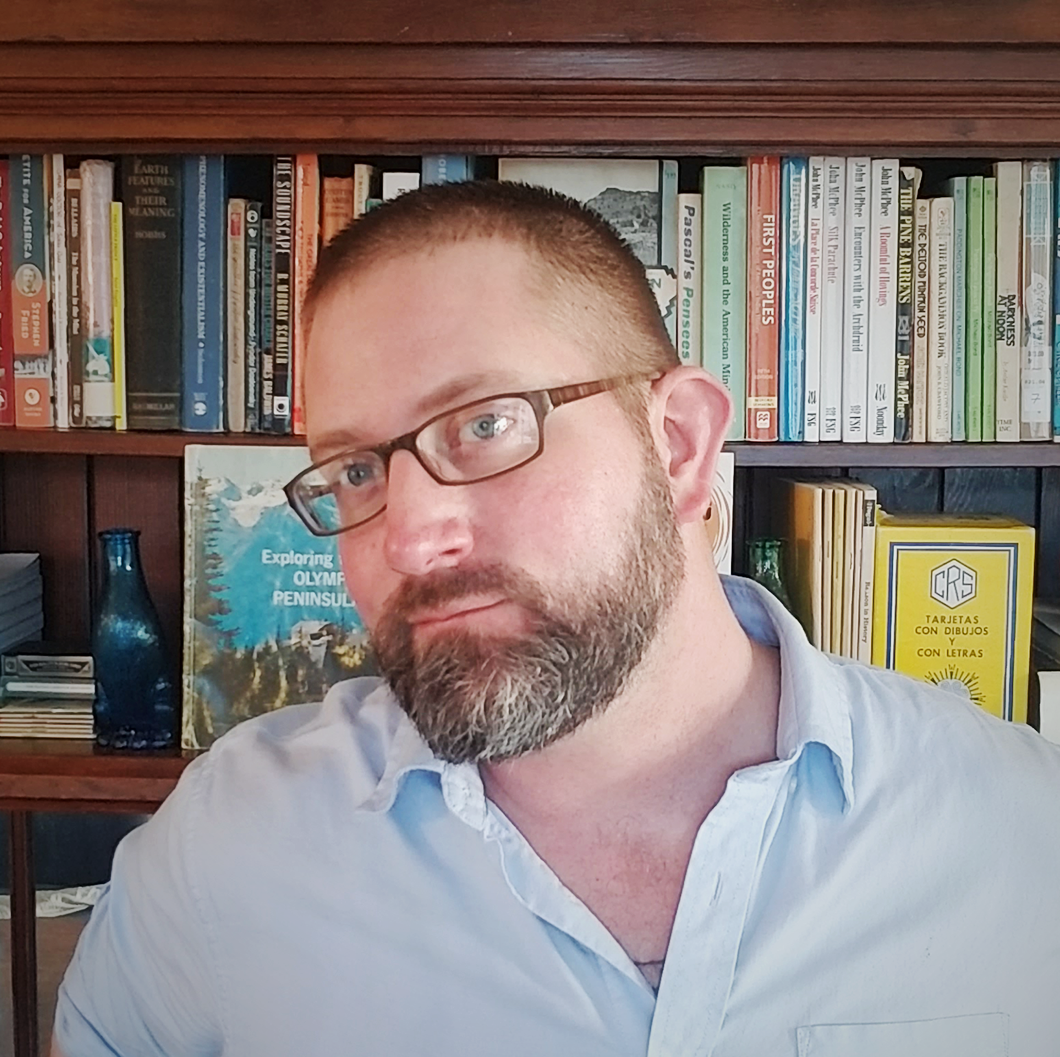Andrew Weymouth
2022 Capstone
University of Washington
Project sponsored by
Anna Trammell,
Archives and Special
Collections Manager
of the Tacoma Public
Library's Northwest Room
· "Uncle Sam
Sees The Danger"
The American Standard,
1901/02

This work has collected, analyzed and mapped historical language in newspapers, periodicals, legacy oral history recordings and archival collections describing immigrant communities in Washington and Oregon and visualize these trends in language and how they may have been influenced by specific commercial interests in the nineteenth and twentieth centuries.
What is the purpose?
The intention of this work is to bring both the industrial interests that influenced media representation, and the lived experience of the communities affected by that language down to a human scale. By analyzing these documents and noting how different communities were being represented depending on commercial interests, we can make new connections and understand the origins of seemingly immemorial cultural perceptions.
Why does this matter?
Why air out frequently offensive material from over 100 years ago? Just as the categorization of Lesbian and Gay topics under Abnormal Psychology, Perversion and Derangement in the Dewey Decimal System quietly stigmatized generations, I feel that this language may still influence our perceptions of ourselves and other communities, long past it's original intended use.
The lack of accountability in the dissemination of hate speech also has parallels with our current condition, where this language is now propelled and reflected digitally. Though technology leaders are quick to deflect and opine that "you can't put the genie back in the bottle," algorithms, and these collected works, have flesh and blood authors behind them, and those authors very often have commercial and economic interests behind their creations.
Illema Study Club, "American Problems," 1920
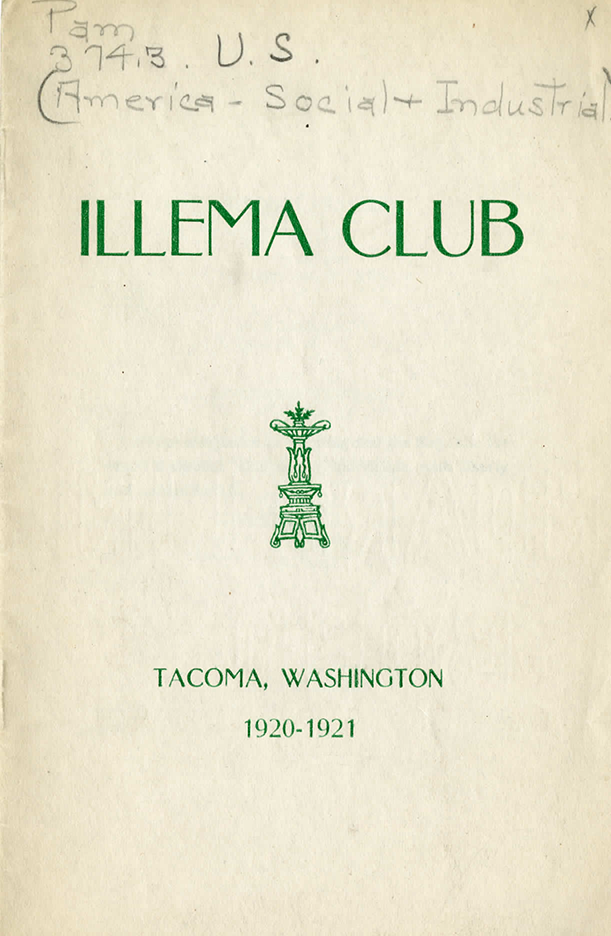

The staying power of this language also has to do with the significance of this period in the Pacific Northwest. Our time frame begins ten years before the United States Census Bureau declared the closure of the western frontier. What follows feels like an ideological rather than physical land grab.
A prominent theme throughout this research is the concept of "retaining" the American character in Washington and Oregon, when it was clearly churning with development. Settlers perpetually gauge other immigrant groups on their ability to assimilate or "Americanize," with particular focus on differentiating between "New Immigrants" and "Old Immigrants," though they may have only arrived within ten years of one another.
During this period in American history, racial animosity was frequently used to divide labor, leading immigrant groups to undercut one another to the industrialist's advantage. Racial provocations would also be used as a straw man for industrialists to argue against anti-monopoly legislation, shape narratives around land development and act opportunistically during times of war.
· Washington Masonic Journal, June 1925
· What adjectives are used to describe these groups and how do they change over time in relation to industrial interests?
· When do immigrant groups stop being referred to by their country of origin and become "American," "White" or hyphenates, such as Polish-American?
· How do world events shape these representations? Are there also industrial motives behind these narratives, as in the case of WWII opportunism on the part of agricultural interests seizing Japanese American farmland during incarceration?
Paraphrasing the official statement of the Tacoma Public Library's Northwest Room, you will encounter offensive, oppressive, racist, and/or outdated references and representations within this exhibit. The material is made accessible for transparency, accountability, and education.
As this project is interested in how community groups are being described in historic materials, outdated and racist search terms needed to be utilized in the creation of this research. For example, in collecting articles for the Black community, searching "negro labor" within the parameters that were repeated for each community group (Washington and Oregon State publications, 1880-1930, sorted by relevance) yielded 340 results, as opposed to "colored labor" (165) and "black labor" (55). That said, all of my descriptions for this community will use Black, drawing description guidance from the Archives for Black Lives in Philadelphia.
Arbeideren, German Language Tacoma Newspaper, 1892-04-01
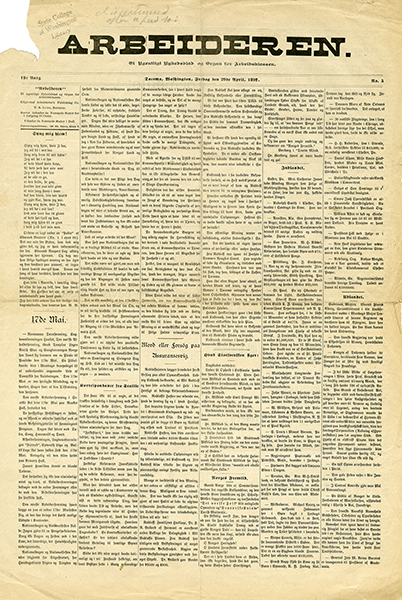
· I have chosen to refer to each group simply from their country of origin rather than hyphenate-American though many of the people addressed in this media may have been American citizens. This was a decision to make the material easier to read and less redundant.
· In future iterations of this project, I would like to rename all subject tags for Hindu materials to South Asian, as implemented in the South Asian Digital Archive. I decided on Hindu because it was the most popular and accurate identifier used by the media during this time. That said, this description does assume religious practice, which is not necessarily correct.
· Finally, of all the groups described in this project, the only communities that were not immigrants are Native Americans. That said, I felt that the representation of this community was a crucial element to this work, examining how the media often 'othered' these communities to engage in myth making around who a true American was and what they resembled.
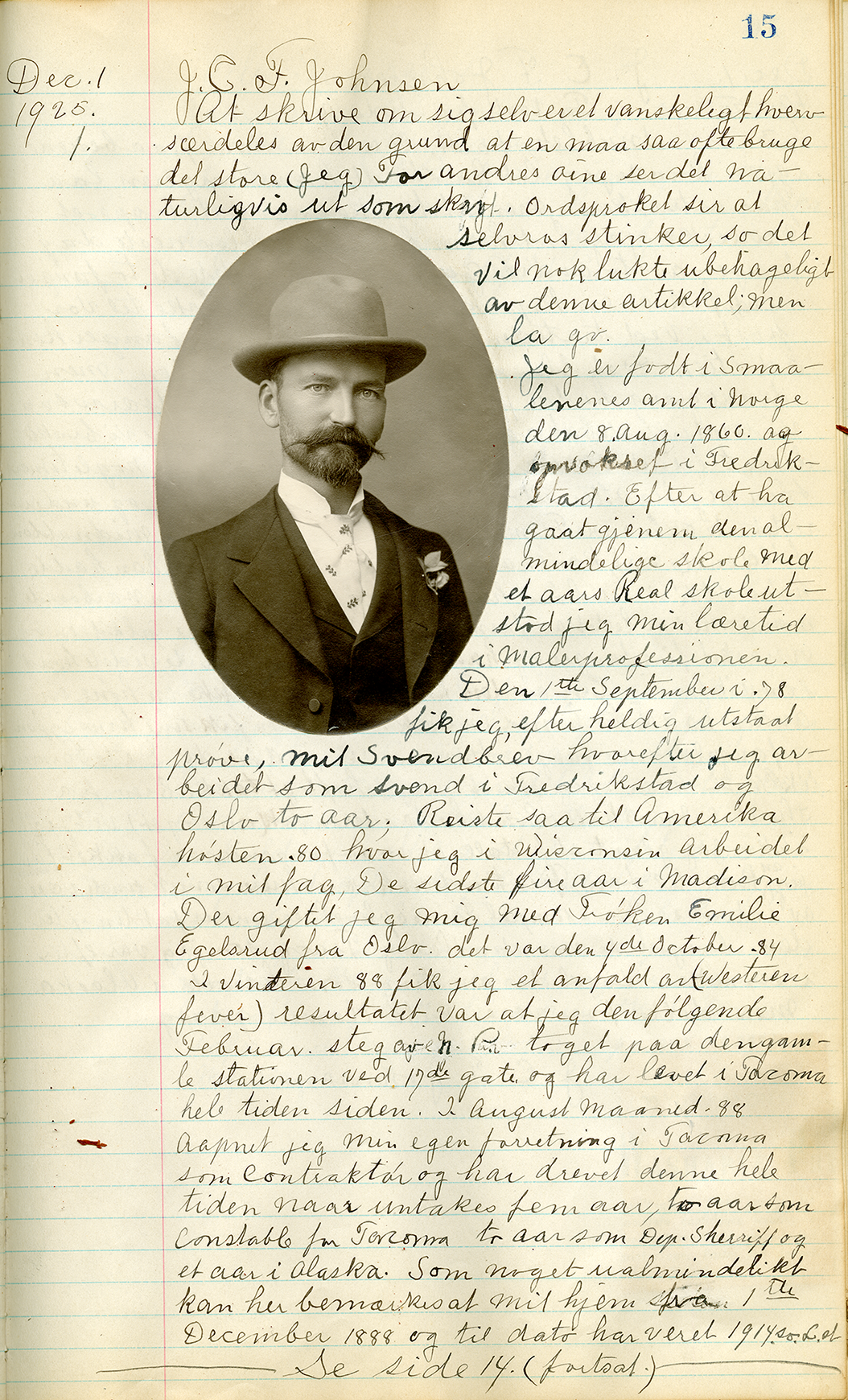
The following community groups were chosen for this research:
Informed by these archival collections, historic newspapers, periodicals and legacy oral history recordings, I felt the following communities would be most appropriate to research for this time period in Washington and Oregon state.
· Black
· Chinese
· Filipino
· Finnish
· German
· Greek
· Irish
· Italian
· Japanese
· Korean
· Native American
· Norwegian
· Polish
· South Asian
These communities were selected using two resources.
The first was the 13th Federal Census of 1910. I chose this document because it is conveniently centered in this project's time span, and it is one of the first documents to include ethnicity in the population numbers for Washington and Oregon state. Of course, these numbers need to be read with extreme skepticism, but they do provide us with an insight into the diversity of the Pacific Northwest at this moment.
The second resource that informed my focus was the Northwest Room, the archive of the Tacoma Public Library. Anna Trammell, the Lead Historian for the Northwest Room and also the sponsor of this Capstone, curated archival collections and oral history recordings which applied to my area of focus and needed organization, finding aids and digitization.
These projects helped me learn about the Norwegian American community through the Ancient Order of Vikings, a fraternal organization for immigrants, and the Puyallup Valley chapter of the Japanese American Citizens League, a nationwide organization which played a crucial role in WWII incarceration. I also pulled from the Northwest Room's Bicentennial Oral History Project, where digitized recordings shed light on Puget Sound's Polish, Italian and Native American communities.
· Excerpt from the Ancient Order of Vikings Scrapbook
This process involved retrieving the top 40 items of each group based on relevance, or the greatest number of matches for each search term. The searches all followed the same formula, "_____ labor," 1880-1930 date range, and Washington or Oregon state based publications. From these forty items, results were filtered down to 10 items based on their locality.
Items that were reprints of stories outside of Washington and Oregon were removed. Documents generally focused on events within this area, but editorials on some national topics could be included if they provided insight into Pacific Northwest culture. These ten items were then separated into five earlier and later halves, demonstrating linguistic change over time.
Words used in the search were then removed from results. For example, in "Japanese labor," "Japanese," "labor," "laborer" and any words referring to that community group would be removed from visualizations, including slurs. This was not done to sanitize the material, rather to focus on the underlying industrial and economic elements that may have been influencing this media.
Pursuing this project, I felt it was most important to focus on the lived experience of community members who may have been impacted by this language, so I spent a good time vetting, transcribing and hosting the oral history material.
I would love to spend more time focusing on industrialists during this period to illuminate their active role in working with labor leaders and media outlets to disseminate these concepts. Clarifying the roles of industrial and commercial forces during this time would create very compelling historical connections between the publication of materials and their echoing impact on these communities.
Technically, I would like to pursue making all of the elements of this work mobile and touchscreen optimized.
· A Paper on Immigration, R.H. Case, 1915/03/31
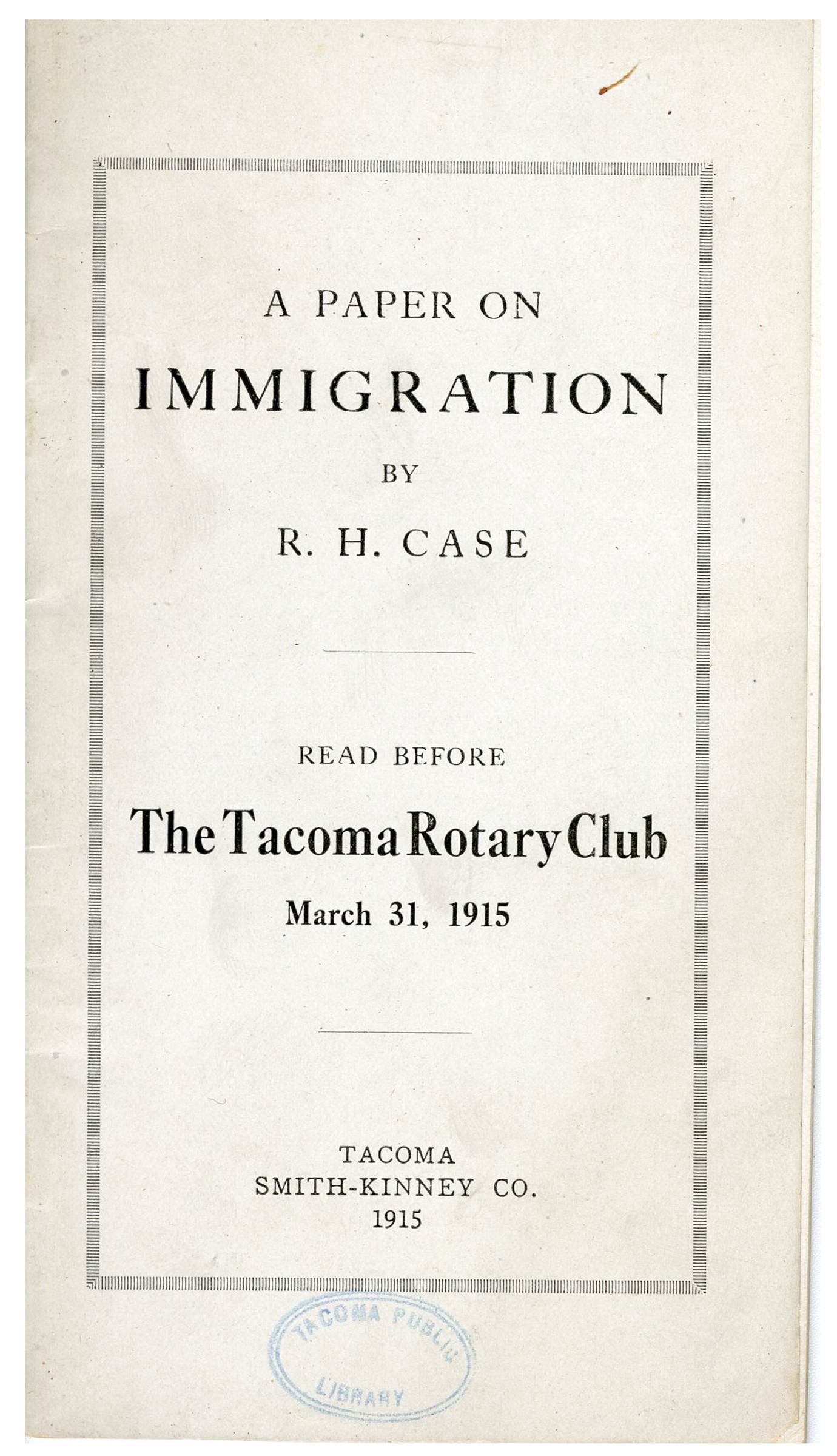

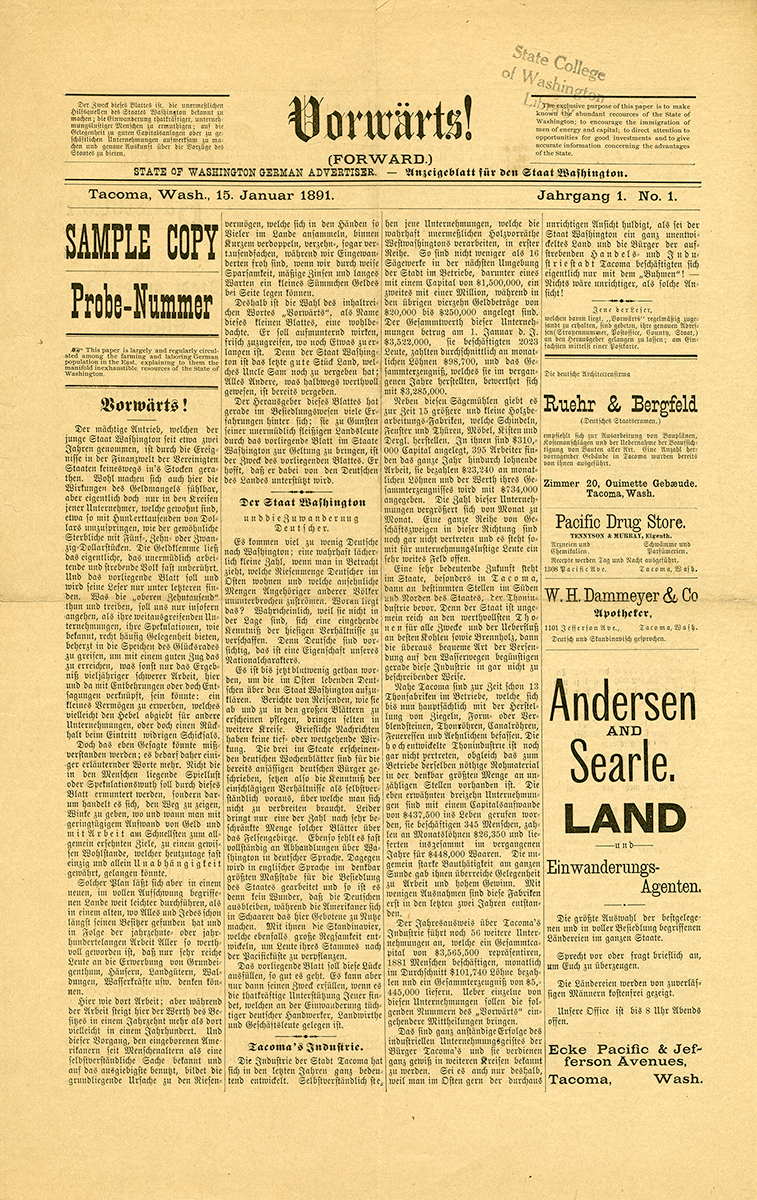
I would like to thank Anna Trammell, Spencer Bowman and Ilona Perry at the Northwest Room for being incredibly generous with their time and effort in supporting this project. I would also like to thank Kate Thornhill at the University of Oregon for advice on shaping and hosting this work.
I have a huge debt of gratitude to Olivia Winkle and Devin Becker at the University of Idaho for helping guide me through the process of working with CollectionBuilder (and creating it in the first place!) I also would like to thank Elliott Stevens and Sarah Ketchley at the University of Washington for their advice on the text mining elements of this work. Finally, I would like to thank Lourdes Santamaria-Wheeler of the University of Florida, whose class on ethical exhibit description through We Here was hugely influential on the design of this project.
· Vorwärtz! (Forward!), German language newspaper, 1891/01/15
1 “Victory to Mean Blow to Industry. Repeal of Tolls - Oregonian (Published as Morning Oregonian) - April 1, 1914 - Page 2,” n.d., 1.
2 “Characteristics of Chinese Laborers - Oregonian (Published as Morning Oregonian.) - September 14, 1899 - Page 4,” n.d., 1.
3 “White Supremacy and the Alien Land Laws of Washington State - Seattle Civil Rights and Labor History Project.” Accessed January 31, 2022. https://depts.washington.edu/civilr/alien_land_laws.htm.
4 Sullivan, Doreen. “A Brief History of Homophobia in Dewey Decimal Classification.” Overland Literary Journal (blog). Overland literary journal. Accessed April 30, 2022. https://overland.org.au/2015/07/a-brief-history-of-homophobia-in-dewey-decimal-classification/.
5 “Greeks Turn on Foreman. Frank M’Gee Stops Attack - Oregonian (Published as Morning Oregonian) - April 8, 1908 - Page 11,” n.d., 1.
6 “Welcome to Northwest ORCA - Northwest ORCA.” https://northwestroom.tacomalibrary.org/index.php/.
7 Archives for Black Lives8 South Asian American Digital Archive (SAADA). “Search.” Text. Accessed April 30, 2022. https://www.saada.org/browse/theme/early-immigration.
9 “1910 Census: The 13th Federal Census Shows Washington.” Accessed April 1, 2022. https://www.historylink.org/File/9444.
· Tacoma World, 1888/12/01, "A Word of Caution to Emigrants Starting West"
All images on this page are courtesy of the Tacoma Public Library's Northwest Room
Full list of credits and copyright statements for all materials included in the CollectionBuilder Object Repository.
A full list of text mining resources for all community groups can be viewed here.
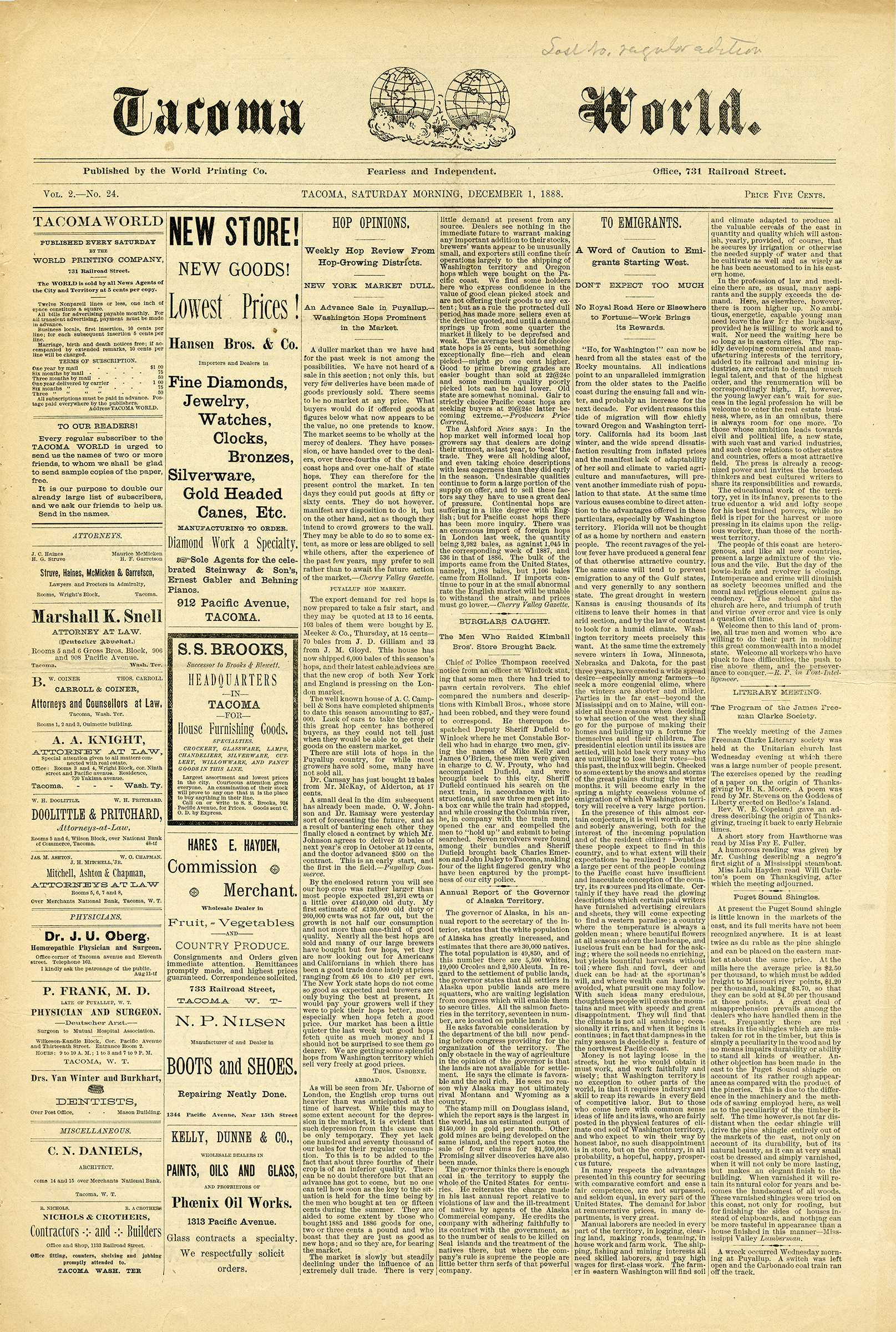
Andrew Weymouth is an archivist, exhibit designer and writer
working in Tacoma, WA, recently completing an MLIS degree
from the University of Washington. Published areas of interest
include oral history, displacement, settler colonialism and the
history of libraries in the western United States.
Click here to view Portfolio, CV, past projects and site
or reach out directly:
andrewrainsweymouth@gmail.com
